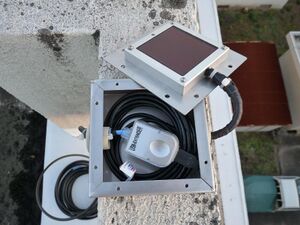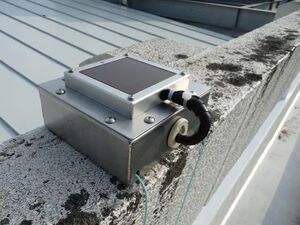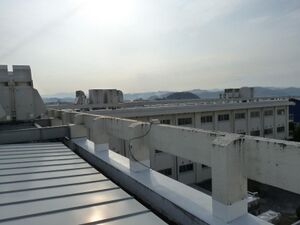Yonago
Yonago National College of Technology, Yonago, Japan (in Japanese:米子高専)
Maintained by Nobuaki Ochi[1]
Station now moved to Setagaya Japan
JP_YONAGO_3 20120101-20120309 (YONAGO_3 was halted on 20120309) JP_SETAGAYA_1 20120607-20120630
fullname: Setagaya Japan station ID: 1 longitude: 139.644466 latitude: 35.637801 height: 54 m S/N: 1040006.000 Since: 20120607-1556 (local time)
The S/N 1040006 is same with that of YONAGO. I halted the YONAGO station on 20120309 and the detector was reused as the Setagaya station. The station is about 8km from the most crowded area of Tokyo. (from Email from the maintainer) --GuentherWuchterl 16:04, 10. Jan. 2013 (UTC)
Site Info
Map:[2]
Longitude: 133° 17' 21"E
Latitude: 35° 27' 21"N
(The long. & lat. values were corrected on 20/Jan/2010; now using WGS84 coordinates.)
Elevation: 24m a.s.l.
Japan Standard Time = Universal Time + 09:00
Yonago city has a population of 150,000 and the density of 1,100/km^2.
Observation
First light: Dec. 8th 2009
Measurement interval: 1 second
YONAGO_3
I replaced lightmeters at Yonago and Bisei from Mark2.3 to MarkPro2.4. So please provide ACCESSKEYs for them. Probably STATIONIDs will be JP_YONAGO_3 and JP_BISEI_2, respectively.
YONAGO_3 stationId: 3 long/lat/height: same with YONAGO_1&2 S/N: 1040006.000 Since: 20100723 15:14 (localtime) type: MarkPro2.4
YONAGO_2
June 2010: On the other hand, I changed the lightmeter at Yonago, from No.42 to No.98. I think a new STATIONID should be given.
fullname: Yonago Japan stationId: 2 longitude,latitude,height: same with YONAGO_1 lightmeter: Mark 2.3 V05.05 S/N 908098.1415
Installation
The detector is mounted on an original stainless box, which stores the USB cable and one half of USB-Extender. The box is fixed by wires to a rail on the rooftop of a YNCT building. A 10m LAN cable is connected to a laptop PC through a counterpart of USB-Extender.
Calibration
Data: Feb 23 20:04 to Feb 24 9:20 UTC; Feb 24th JST:
X = c ( b (a exp (n(1+dT)/a) - 1) + n )
n ... counts (sensor output)
X ... physical quantity (total radiation in [W/m²] or
horizontal illumination [Lux])
a = 1.1881e+05, b = 1.2505e-02, c = 1.5932e-09, d = 4.4193e-03, for [W/m²]. a = 1.1881e+05, b = 1.2505e-02, c = 1.6858e-07, d = 4.4193e-03, for [Lux].
Background x0=3.9 mlx
Watt/m² --> Lux 105.81 Lux --> Watt/m² 0.00945
First try, 20th/21st Feb. UTC, 21st Feb JST
In [108]: SJD=(X.JD > mx.DateTime.DateTime(2010,2,20,20,15).jdn)
& (X.JD < mx.DateTime.DateTime(2010,2,21,9,35).jdn)
In [109]: X.fit_em1_to_natLight(JD_select=SJD,type='em1c0T'
,Lux_range=[0.0001,300000])
Out[109]:(array([ 1.13142993e+05, 7.29596715e-03,
1.61836591e-07, -3.95536497e-03, 3.60775365e-03]),
Feb. 23/24th UTC, 24th JST: Night and morning twilight smoother
In [519]: SJD=(X.JD > mx.DateTime.DateTime(2010,2,23,20,04).jdn)
& (X.JD < mx.DateTime.DateTime(2010,2,24,9,20).jdn)
Out[521]: array([ 1.18814396e+05, 1.25054564e-02, 1.68583720e-07,
-3.92652111e-03, 4.41932827e-03]),
1)
In [535]: (0.91/X.Watt_per_square_meter_per_Lux )**-1 Out[535]: 0.009450549450549451
1.68583720e-07*0.009450549450549451 Out[537]: 1.5932087824175826e-09
16:05, 10. Jan. 2013


